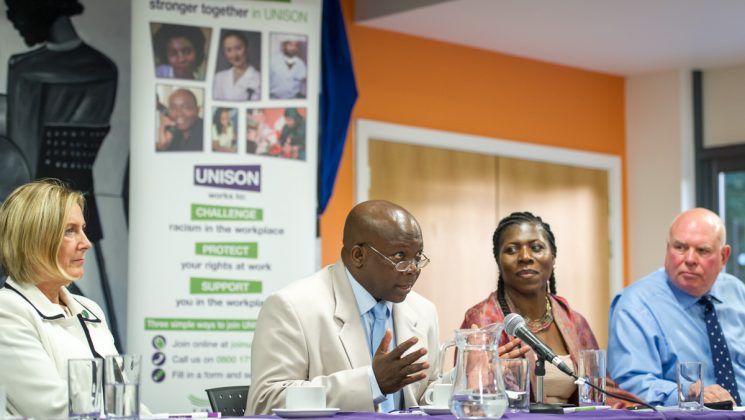Kebbah Manneh, Chair of UNISON Cymru Black Members Group, in the centre of the photo
There has been a 56 per cent increase in reported cases of modern slavery in Wales in the last year, according to Welsh government statistics. Cabinet Secretary Vaughan Gething AM, will today (Thursday) tell a gathering of public service workers that 193 referrals of potential victims of slavery were made here in 2017.
Mr Gething has recorded a special video address for the UNISON Cymru Wales event in Butetown Community Centre, Cardiff, organised by the trade union’s Black members to mark International Day for the Remembrance of the Slave Trade and its Abolition.
Stephen Chapman, Welsh Government’s Anti-Human Trafficking Co-ordinator will also speak at the event about the increasing phenomenon of modern slavery.
Kebba Manneh, Chair of UNISON Black Members Group said,
“There are more people in slavery today across the world, than in the entire 350 year history of the transatlantic slave trade and slavery in Wales is on the rise. It could be the woman trapped in servitude or trafficked into the sex trade, the man in forced labour or the child who has been trafficked by criminal gangs and suffered horrendous abuse.
“Trade unions have a major role in the fight against modern slavery. With 100,000 members in Wales, UNISON can help educate our members and the wider community in recognising the signs of exploitation.
“Welsh government’s code of practice for ethical employment in supply chains provides an opportunity for unions to work with employers to ensure workers are treated fairly and no-one is exploited.”
Notes for editors
- Using International Labour Organization figures, the Human Trafficking Foundation says that there are more people in slavery today across the world, than in the entire 350 year history of the transatlantic slave trade.
- Welsh government reports in 2017, 193 referrals of potential victims of slavery were reported. This represents a 56% increase from 2016.
- The Human Trafficking Foundation reports in the UK in 2017, 5,145 potential victims from116 different countries were referred into the National Referral Mechanism to be identified as survivors of trafficking and to receive support. It says, in reality, the extent of human trafficking in the UK is likely to be far higher.
- Unseen UK says in 2016, an estimated 40.3 million people worldwide were in modern slavery, including 24.9 million in forced labour and 15.4 million people in forced marriage. This equates to 5.4 victims of modern slavery for every 1,000 people in the world. 1 in 4 victims of modern slavery are children. Of the 24.9 million victims of forced labour, 16 million people are exploited in the private sector including domestic work, construction or agriculture. 4.8 million people are victims of forced sexual exploitation, and 4 million people were in forced labour imposed by state authorities. Women and girls account for 99% of victims in the commercial sex industry, and 58% of other sectors in other sectors of forced labour.
- Victims of modern slavery will often be fearful and reluctant to seek any help. Many come to the UK to try and escape abuse with the promise of a better life only to find they experience further exploitation.
- The Welsh Government has published advice on the signs of slavery. Due to the nature of slavery and the reluctance or inability of those affected to seek help, you may not realise you’ve come into contact with a victim. Some of the things to look out for include:
- limited family contact
- physical abuse
- distrust of authority
- having no friends
- acting as if under another’s control
- appearing malnourished
- disorientation
- avoiding eye contact
- unable to speak any English
- To report slavery you should call the Modern Slavery Helpline on 0800 0121700. There is also a telephone number providing support for victims: 0800 731 8147.
Contact
Alastair Gittins, UNISON Press Officer on 07816 538397
Photo credit: Natasha Hirst

